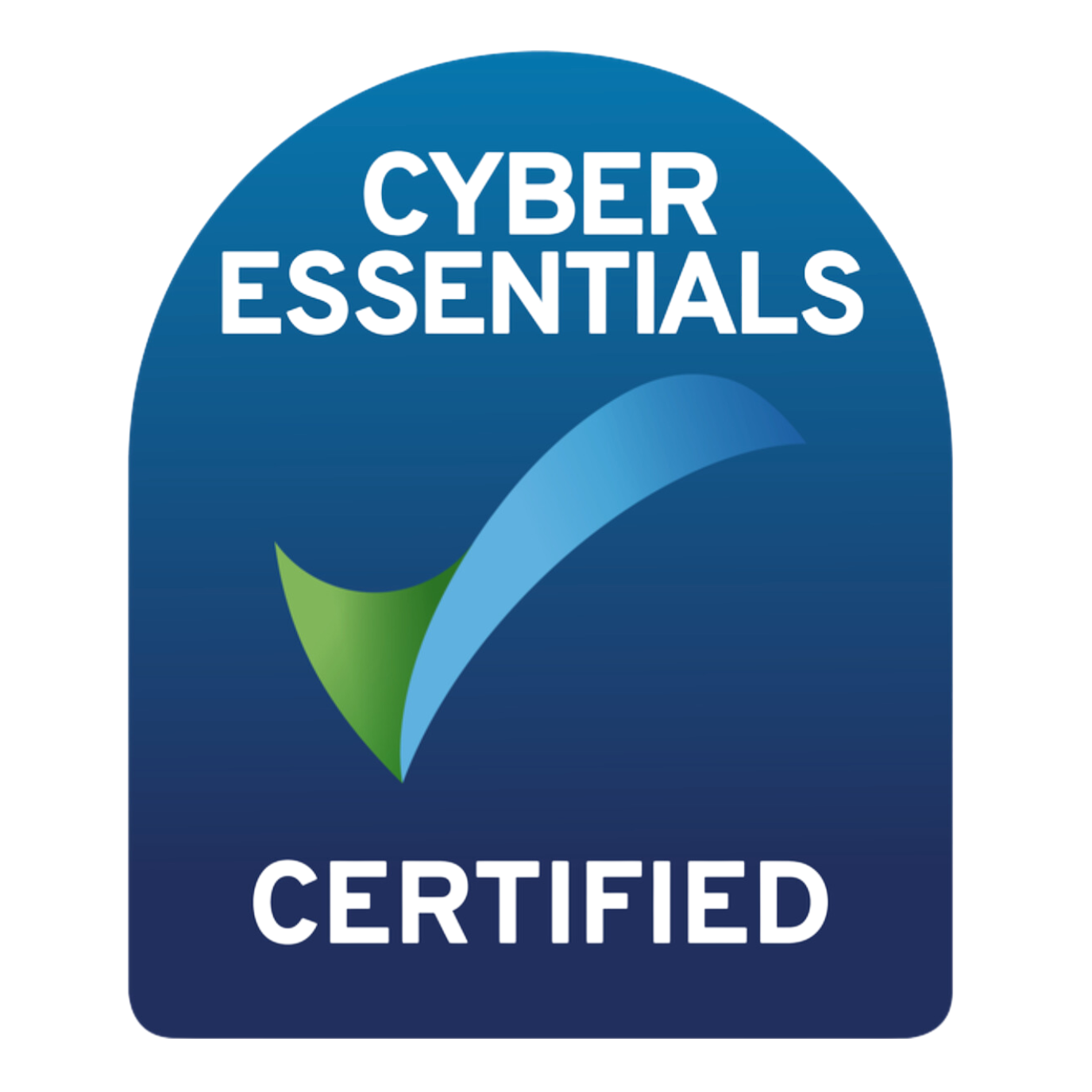Why Cyber Essentials Certification Is More Than Just a Tick-Box Exercise

Cyber Essentials
Cybersecurity has become a cornerstone of operational resilience. However, for many UK businesses, cybersecurity is still viewed through the narrow lens of compliance.
This mindset often leads to a “tick-box” approach—meeting the bare minimum requirements to satisfy regulators or contractual obligations. But Cyber Essentials certification is far more valuable than a compliance badge. It represents a proactive step towards safeguarding your business, building trust with stakeholders, and creating a competitive edge.
What Is Cyber Essentials, and Who Needs It?
Launched by the UK Government in 2014, Cyber Essentials is a simple but effective scheme designed to help businesses of all sizes protect themselves against a wide range of common cyber threats. There are two levels of certification:
Cyber Essentials and
Cyber Essentials Plus.
This is a self-assessment option that covers the fundamental technical controls every business should have in place. These controls include:
• Boundary firewalls and internet gateways
• Secure configuration
• Access control
• Malware protection
• Patch management
Cyber Essentials Plus
This version includes all the requirements of the basic certification, but also involves a hands-on technical verification carried out by an external certifying body. This provides greater assurance and is often required for businesses handling more sensitive data or engaging with the public sector.
Who Needs It?
While any UK business can benefit from Cyber Essentials certification, certain sectors and scenarios are seeing it become a practical necessity—often as a prerequisite for doing business at all.
Organisations Bidding for UK Government Contracts
Since October 2014, Cyber Essentials certification has been a mandatory requirement for suppliers bidding on UK government contracts that involve the handling of sensitive or personal information. For example, an IT services provider looking to supply cloud-based support to a government department would not be eligible to apply without at least basic Cyber Essentials certification.
This requirement has extended across a range of public sector contracts—from digital infrastructure projects to facilities management firms supplying services to local councils.
Healthcare Providers and NHS Suppliers
With the NHS being a frequent target of cyber attacks, suppliers that interface with healthcare systems are under growing pressure to demonstrate baseline security standards. Whether you’re an app developer offering patient data management tools, a cloud provider handling diagnostic images, or a hardware vendor delivering IoT medical devices, Cyber Essentials helps ensure that your systems meet the NHS Digital’s Data Security and Protection Toolkit requirements.
Educational Institutions
Schools, academies, and universities handle vast amounts of personal data—from student records to staff payroll systems. These institutions are increasingly targeted by ransomware attacks, often due to legacy systems and underfunded IT departments. Cyber Essentials provides a structured, affordable way for educational trusts to improve their cyber posture. For instance, several multi-academy trusts we’ve supported have found that Cyber Essentials not only helped them secure sensitive data but also reassured parents and governors about student safety online.
SMEs Working with Larger Enterprises
Large enterprises are increasingly holding their supply chains accountable for cyber risk. If you're an SME working with banks, retailers, or manufacturing giants, you're likely to be asked about your cybersecurity credentials. Cyber Essentials offers a credible, government-backed certification that signals your business takes data protection seriously.
Take, for example, a small logistics company we worked with that was supplying inventory management services to a major UK retailer. Without Cyber Essentials certification, they were at risk of losing the contract during a supplier audit. Certification not only retained their client but opened up new partnership opportunities with similar enterprises.
Tech Startups Looking for Early-Stage Credibility
Startups face an uphill battle earning trust, especially when they deal with user data or provide SaaS platforms. Investors, partners, and customers want assurance that security has been considered from day one. Cyber Essentials is a lightweight but effective way to show that your startup isn’t cutting corners. One London-based fintech startup achieved certification just six months post-launch and used it as a proof point in their pitch deck—which helped them close their first enterprise client.
Common Misconceptions: “It’s Just for Compliance”
One of the biggest misconceptions about Cyber Essentials is that it’s merely a paperwork exercise—a way to satisfy procurement requirements or satisfy regulatory frameworks like GDPR. While compliance is indeed a factor, treating it solely as a compliance task misses the point.
Improved Cyber Hygiene
Cyber Essentials helps businesses implement basic but critical security measures that significantly reduce exposure to common threats like phishing, ransomware, and malware. These aren’t complex fixes; they’re foundational practices that create a strong security baseline.
Increased Customer Trust
Today’s customers are more aware of data privacy than ever. Displaying your Cyber Essentials badge on your website or marketing materials demonstrates a commitment to keeping data safe. This builds credibility, especially in industries like finance, healthcare, and tech.
Reduced Risk
Many cyber attacks exploit basic vulnerabilities—outdated software, poor access controls, or misconfigured devices. Cyber Essentials addresses these vulnerabilities head-on. By implementing the scheme’s five controls, businesses significantly lower the risk of a successful cyber attack.
Real-World Impact of Certification
To illustrate the tangible benefits of Cyber Essentials, let’s look at a few anonymised examples drawn from our experience working with UK organisations.
Case Study 1: Preventing a Phishing-Driven Breach
A mid-sized recruitment firm came to us after suffering a phishing attack that compromised several staff email accounts. They hadn’t yet adopted Cyber Essentials. Post-incident, they engaged Cybergense to guide them through the certification. By enforcing stronger access controls and implementing multi-factor authentication (MFA), they dramatically reduced the likelihood of future email compromises. Within months, the same phishing tactics failed to yield any breach.
Case Study 2: Securing Remote Work for an Educational Trust
A multi-academy trust needed to quickly adapt to remote teaching during the pandemic. With no formal cybersecurity framework in place, they faced significant risk. We helped them achieve Cyber Essentials Plus certification, ensuring all remote devices were securely configured and managed. As a result, they avoided several attempted ransomware infections targeting their remote endpoints.
Insurance and Cost Savings
Cyber Essentials is increasingly recognised by cyber insurance providers.
Certification can lower premiums and even qualify businesses for better coverage. One of our clients, a logistics firm, reported a 20% reduction in their annual cyber insurance cost after becoming certified.
Certification as a Competitive Advantage
Far from being just another checkbox, Cyber Essentials can actively improve your market positioning.
Enhanced Credibility in Tenders
When bidding for contracts—especially in the public sector or with security-conscious clients—Cyber Essentials is often a mandatory requirement. Having it already in place speeds up procurement processes and sets your business apart from uncertified competitors.
Building Client Trust
Whether you're a SaaS startup, an MSP, or a professional services firm, showing prospective clients that you've taken proactive security steps can make or break a deal. Cyber Essentials tells clients that you're serious about data protection.
A Foundation for Further Growth
Cyber Essentials lays the groundwork for more advanced frameworks like ISO 27001. It demonstrates maturity in your cybersecurity posture and makes the leap to more rigorous standards much easier.
How Cybergen Can Support The Cyber Essentials Process
At Cybergen, we understand that for many businesses, cybersecurity can feel overwhelming. That’s why we provide tailored, hands-on support throughout the entire Cyber Essentials journey.
Initial Readiness Assessment
We start by evaluating your existing security posture against the scheme's five key controls. This helps identify gaps and create a clear action plan.
Remediation Support
Our team works with you to fix any vulnerabilities or misconfigurations, whether that’s patching outdated software, helping with access control policies, or advising on secure remote setups.
Certification Liaison
We manage the certification process end-to-end, coordinating with certification bodies and helping prepare the required documentation. For Cyber Essentials Plus, we also assist in preparing your systems for external testing.
Ongoing Cyber Hygiene
Cyber Essentials isn’t just a one-time activity. We offer ongoing support and advice to help your business maintain compliance and stay protected as threats evolve.
Final Thoughts
Cyber Essentials is more than a compliance checkbox; it’s a business enabler. From reducing risk and improving operational resilience to winning new business and boosting client trust, the benefits are both practical and strategic. For UK businesses aiming to thrive in a digital-first economy, Cyber Essentials is not just worth it—it’s essential.
If you’re ready to take the next step toward certification, or just want to understand where your business currently stands, Cybergen is
here to help.








